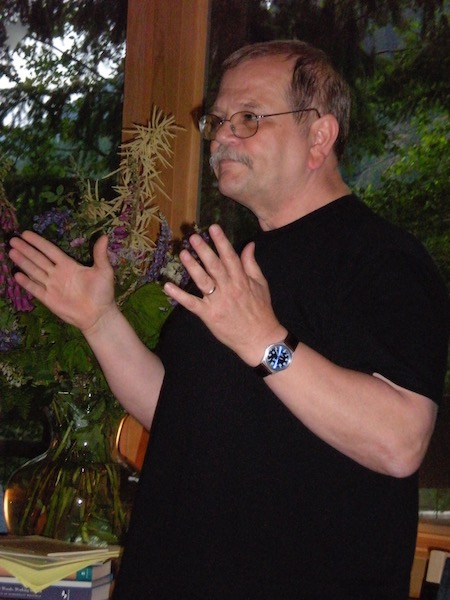we hear the sound of a woman’s high-heeled shoes striking the stones of the floor,confident stride, strong hips, & I am back in a hospital bed at Clark AirForce Base, the Philippines, September, 1969, hearing a pair of shoes tapping their waydown the corridor outside my ward. I’d been knocked off a motorcycle by a drunk jitneydriver in Cavite City five days before, left leg shattered, compound fractures,bone left on the street, flown to the surgeons at Clark who cleaned, debrided, sutured& hung me up in traction. There were three of us in the ward. An air force guyhad blown the fingers off his left hand with a homemade bomb. He’d been at Cam Ranh Bayat a party on the beach. Stupid, stupid, he said. The other guy was army, only seventeen,right leg gone below the knee, left arm just above the elbow. Out on a routinepatrol his first week in-country, stood up to pee & the other newbie, pulling first guard,shot him. We went through boot together. He spent his days with a model ship, awkwardas it was to snap the pieces off & glue them into place one-handed. If I can do this, maybeI can put myself together again, he said. Each night after lights out, he cried for an hour, softly,into the snot on his pillow. The staff shrink was pissed I wouldn’t say yes to amputation, saidI was immature. By that time I was hooked on Demerol, my butt cheeks already baredat the stroke of each third hour, ready for the needle. End of that week,late, they wheeled in three gurneys, jammed them tight against the walls, wokeus up. One held an army captain, left leg just a stump. He was hyper. Twitchy. Talkeda nurse into a telephone, called his wife. I’m fine, sweetheart, just fine. I’m coming home, voice cracked.He didn’t mention the leg. Second guy was nothing but plaster & gauze, both arms in casts, slitsat eyes & mouth. He didn’t move, didn’t make a noise. Third man didn’t have any sheetsover him, only a gown. Both legs gone, left arm missing nearly to the shoulder, rubber tubes in bothnostrils, a pair of IV bags hung on posts from either side of the gurney. His mouthwas open, eyes glazed. He made a sound like a pair of house slippers shuffling across a barecarpet. His catheter bag was half full. One of the volunteers came in the doorjust as the orderlies left. They were officers’ wives for the most part, helping out while theirhusbands flew supply runs or medevacs, stabilized patients, wrote long, exacting reports. The warwas far away, except for the wards. They fetched us decks of cards, looked for paperbacks,helped us fill out daily menus, poured out cups of water, let us flirt a bit, ignored our looksof lust. This one looked tired. She talked with the captain, who still seemed buzzed, his handsfluttering like bats. His stump thumped up & down as he talked. His top sheet was stainedbrown. He kept repeating home, home, home. I heard her say the plane would load & leave real early, heshould try to sleep. She put a hand on his forehead. He settled, closed his eyes. Shemoved on to the gauze man, but didn’t do much more than stand. She reached a hand as thoughto touch, but stopped, adjusted the edge of a sheet & turned away. She murmured something lowto the third soldier, put her ear down near his face & nodded. She took a cup of icefrom a stand, carefully placed a chip between his lips & let it melt. She did it twicemore. Anything I can get you, soldier? Her voice was soft. He made a groan, likea rusted nut coming loose on a bolt. Yeah, he said, I want some cake, a chocolate cake.She watched as water dribbled down his neck, said What? He said it again. She shook her head.I’m sorry, she said, but you can’t eat. She tried to give him one more piece of ice. Lady, he said,Jesus, lady, I don’t wanna eat it. I just wanna look at it. He clamped his teeth down hardgrinding away at pain, turned his head to the wall. A minute more, she left the ward,gone for the night. Then it was another shot for me, lights out again & sleep. They camebefore breakfast, the nurses, changing linen, bags, IVs, a single bed pan. The sameorderlies took the captain first. He waved at us when he left. Then they took the whiteghost who never moved or spoke. That was when we heard the click of high heels outin the hall & the volunteer walked in, dressed for a date, strapless bright green gown,blonde hair hanging over bare shoulders. She was carrying a cake in two hands, a big roundthree-layer cake, a single candle lit. She walked to the soldier’s gurney & stopped. He heardher coming & turned to look: the froth of chocolate same color as his skin. They didn’t say a word.The orderlies returned. One checked the blood pressure in his remaining arm; onechanged the flow on both IVs. The soldier raised the stump of his arm, let it downsoft on the rumpled sheet. His nose & eyes were leaking. The orderlies releasedthe gurney’s brake & wheeled him out. She took a few steps back to let them pass.We saw her shoulders shake. She stayed like that a long, long time, then turned & leftwithout speaking. The candle had gone out, left a trail of smoke, like a fighter jetleaves across a clear sky. The guy who blew off his own hand said, She could have left ussome. But it was all right. We couldn’t have eaten the smallest bite of that darkness,as here, on a Greek island thousands of miles & more than forty years away,I wait for the bread of the body, kneeling beside a woman who feeds me every day.
On Patmos, Kneeling in the Panagea
Feature Date
- July 12, 2019
Series
Selected By
Share This Poem
Print This Poem
Reproduced from Prairie Schooner 93.1 (Spring 2019)
by permission of the University of Nebraska Press.
Copyright 2019 by the University of Nebraska Press.

Samuel Green’s most recent collection of poems is All That Might Be Done (Carnegie Mellon University Press). He has lived nearly forty years on a remote island on the Washington coast with his wife, Sally, where they edit the award-winning Brooding Heron Press. Green has been a visiting professor at multiple colleges and universities and was selected as the first Poet Laureate of Washington State. Other honors include a National Endowment for the Arts Fellowship in Poetry, an Artist Trust Fellowship in Literature, a Washington State Book Award in Poetry, and an honorary doctorate from Seattle University. From 1968–1969 he served in Vietnam with the US Coast Guard.
This poem will appear in a new collection, Disturbing the Light, from Carnegie Mellon University Press, in the fall of 2020.

Spring 2019
Lincoln, Nebraska
University of Nebraska
Editor-in-Chief
Kwame Dawes
Managing Editor
Ashley Strosnider
Our mission remains what it has been for more than five decades. In the words of founding editor Carolyn Kizer, “We shall continue to encourage the young and the inexperienced, the neglected mature, and the rough major talents and the fragile minor ones.” We remain as committed as we were in 1959 to publishing the best poetry we can find, and to expanding the role and scope of poetry in ways both public and private, innovative and traditional, as an art and as a clear and necessary dialogue in a world overrun with noise.
Poetry Daily Depends on You
With your support, we make reading the best contemporary poetry a treasured daily experience. Consider a contribution today.



